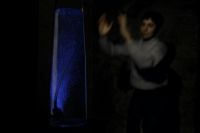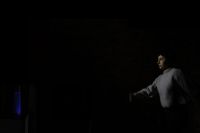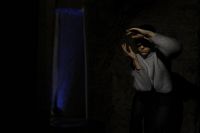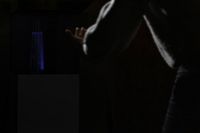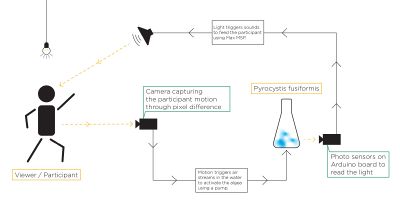Performing Polyphony
A symbiotic performance between human and bioluminescent phytoplankton.
by Frédéric Blais-Bélanger, 2019
_______________________________________________
In music, polyphony refers to the style of simultaneously combining a number of parts, each one being a melody of its own, and at the same time harmonizing with each other. Placed out of its original field, this definition reflects many processes and organisms' behaviour found in nature.
Performing Polyphony explores this idea of collaboration between species as it is a symbiotic duet joining human and Pyrocystis Fusiformis, a form of Dinoflagellates often referred to as Bioluminescent Algea. While the dancer performs, her movements generate air stream into the water, triggering the glow of the algae. Their emission of light is then perceived by a photosensor and translated as sounds that will feed the performer's motion, thus creating a complete loop between the two organisms.
In relation with Haraway's concept, this work is an attempt of "making kin with the earth-bounded". It illustrates on a metaphoric level an interspecies conversation; a symbiotic performance between human and nature.
The technique behind it
As a webcam film live the performer's motion, a Max MSP patch compares the image it receives with the previous one, generating a number of the amount of pixel difference. This number controls the air pump, turning it on or off as it reaches a threshold.
A photosensor calculated the amount of light emitted by the algae. This number is then use in Max MSP to trigger notes on a keyboard; the higher the amount of light, the higher the note. The light also affects the tempo of the music as it slows it down when the amount increases and speeds it up when it decreases.
The research and experimentations for the installation was divided in two main parts and were also made within the frame of two other classes. To access the full documentation of these researches, follow the links below:
- The cultivation and understanding of the Pyrocystis Fusiformis
- The elaboration of a communication platform between human and algae
The growth of the project
For this project, I want to create a platform where Pyrocystis fusiformis and the viewer will be able to socially interact by the forms of sound and dance. Navigating Donna Haraway idea of making kin with the Earth-bounded, I aim to bring the viewer to looking at the micro-organism in a different way, and making them both work in symbiosis.
In a dark space, I intend to invite the viewer to perform some movements that will be transcode into vibrations for the phytoplankton. As a feedback, it will emit light that will then generate sounds, feeding the dance of the participant.
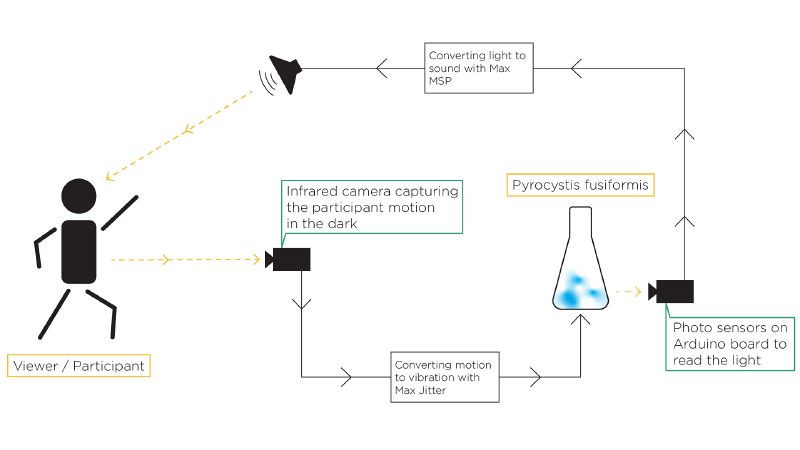 This feedback loop will thus become a conversation that, like dance, will demand a mutual respect from both parties and a constant attention to the partner in order to find a certain synchronism.
This feedback loop will thus become a conversation that, like dance, will demand a mutual respect from both parties and a constant attention to the partner in order to find a certain synchronism.
Inspirations and References
Literature
- “Who and whatever we are, we need to make-with—become-with, compose-with—the earth-bound.”, Donna Haraway
- “We must stop seeing tech and nature as sparring partners, and start concentrating on how helping them to dance.”, Molly Flatt, BBC, 2015
- “In the process [of making workable living arrangements], each organism changes everyone’s world. Bacteria made our oxygen atmosphere, and plants help maintain it. Plants live on land because fungi made soil by digesting rocks. As these examples suggest, world-making projects can overlap, allowing room for more than one species.”, Anna Tsing
- “We forget that collaborative survival requires cross-species coordinations.”, Anna Tsing
Artworks
- The Molecular Ordering of Computational Plants, Andreas Greiner and Tyler Friedman, 2018.
- From Strings to Dinosaurs, Andreas Greiner, 2015.
Other
- Polyphony: the style of simultaneously combining a number of parts, each forming an individual melody and harmonizing with each other.
Bibliography
- Haraway, Donna. Staying with the Trouble, Making Kin in the Chthulucene. Durham: Duke University Press, 2016.
- Tsing, Anna. The Mushroom at the End of the World. Oxford: Princeton University Press, 2015.
Experimentation and Research
- Pyrocystis fusiformis GMU:DIY Bio: doing things with biology/Frederic Blais-Belanger
- Max Jitter/MSP GMU:Connecting Max to the World/Frederic Blais-Belanger
Other Thoughts on BioArt
Bla, bla, bla.
